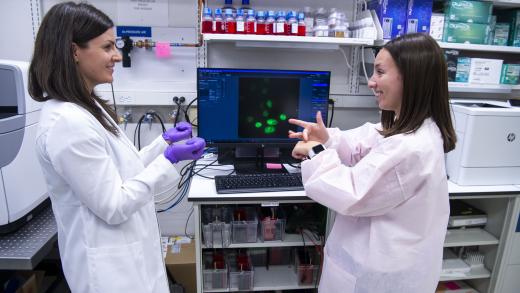
Kent W. Hunter, Ph.D.
- Center for Cancer Research
- National Cancer Institute
- Building 37, Room 4048
- Bethesda, MD 20892-4264
- 240-760-6797
- hunterk@mail.nih.gov
RESEARCH SUMMARY
Dr. Hunter established the paradigm that metastatic progression of breast cancer has a significant inherited component. Using innovative strategies and cutting edge technologies he has identified a number of genes that contribute to inherited susceptibility to tumor dissemination. Dr. Hunter continues to pioneer the use of integrated genetic and genomic technologies to gain better understanding of the genes and cellular pathways that contribute to the metastatic process. Recent efforts include incorporating the knowledge gained from the genetic studies with novel therapeutic compounds or strategies to try to reduce metastatic burden in breast cancer patients.
Areas of Expertise

Kent W. Hunter, Ph.D.
Research
The process of metastasis is of great importance to the clinical management of cancer because most cancer deaths are attributable to disseminated disease rather than the primary tumor. To better manage this critical clinical aspect of cancer it is necessary to gain a better understanding of the factors that lead to metastasis. To date the majority of metastasis research has focused on somatic alterations in tumor cells. However, in spite of decades of research and the identification of a large number of tumor cell-autonomous metastasis-associated genes, the process is still largely a mystery. Furthermore, it is still unclear whether metastasis is driven primarily by somatic events in the tumor or subject to functional variation at the level of the whole organism. Knowledge of this latter component may be critically important to the early identification of patients at risk for metastasis, which might alter their management and improve their prognosis.
The major goal of my laboratory is therefore to complement the existing and historic investigations of the tumor genome by characterizing the previously unexplored realm of the impact of constitutional genetic polymorphism on metastatic progression. To accomplish this, our laboratory initiated an investigation into the effects of constitutional genetic polymorphism on metastatic efficiency. Using the polyoma middle-T transgene-induced mouse mammary tumor model, we demonstrated that the genetic background upon which a tumor arose significantly influenced the ability of the tumor to form pulmonary metastases. Subsequently we have utilized a strategy that integrates population genetics analysis with a variety of genomic tools to begin to identify and characterize the polymorphic genes that drive metastatic susceptibility. To date we have identified more than 10 genetic factors that predispose individuals to develop metastatic disease. Unexpectedly, considering the complexity of the metastatic cascade and the genome, a number of these factors have been shown to directly interact at either the protein level or by direct transcriptional control level. The convergence of these studies on common subcellular complexes provides greater confidence of the role of these factors in tumor progression.
Currently the Hunter laboratory is further expanding our repertoire of tools to include the latest mouse genetic tools as well as high throughput sequencing and epigenetic analysis to provide greater depth for candidate gene discovery and characterizations. Inclusion of these resources will enable increased understanding of the higher order interactions and mechanisms underlying metastatic disease in both the primary tumor epithelium and surrounding tumor-associated stroma. Better understanding of the factors driving metastatic disease will likely lead to better clinical interventions to reduce cancer associated morbidity and mortality.
Publications
- Bibliography Link
- View Dr. Hunter's PubMed Summary.
Integrated sequence and gene expression analysis of mouse models of breast cancer reveals critical events with human parallels
The genomic landscape of metastasis in treatment-naïve breast cancer models
Autophagy promotes the survival of dormant breast cancer cells and metastatic tumor recurrence
Sipa1 is a candidate for underlying the metastasis efficiency modifier locus Mtes1
Biography

Kent W. Hunter, Ph.D.
Dr. Hunter received a B.S. in biochemistry with Highest Honors from the Pennsylvania State University in 1985 and a Ph.D. in Biology from the Massachusetts Institute of Technology in 1991. He was an associate member at the Fox Chase Cancer Center from 1996 to 1999. In 1999, he joined the NCI (former Laboratory of Population Genetics) as an Investigator. He joined the Laboratory of Cancer Biology and Genetics in 2007 and was promoted to Senior Investigator. In 2015 Dr. Hunter was appointed Deputy Lab Chief and served as acting Co-Lab Chief or Acting Chief from 2017-2022.
Job Vacancies
We have no open positions in our group at this time, please check back later.
To see all available positions at CCR, take a look at our Careers page. You can also subscribe to receive CCR's latest job and training opportunities in your inbox.


